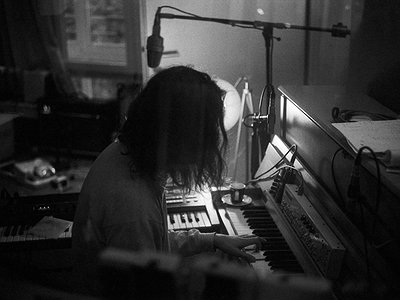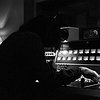Collaborations can take on many forms. What role do they play in your approach and what are your preferred ways of engaging with other creatives through, for example, file sharing, jamming or just talking about ideas?
File sharing is a blessing. It facilitates the process of making music. James and I produced the album in this way. I went to the studio and recorded the first sketches and sent them straight to James. Without losing too many words on the sketches. He immediately worked on those tracks. We just went back and forth like that. But in the end I went to James´ studio in Zürich and we finished them sitting next to each other. For the process after the first recordings and the ongoing production file-sharing was indispensable.
Could you take us through a day in your life, from a possible morning routine through to your work? Do you have a fixed schedule? How do music and other aspects of your life feed back into each other - do you separate them or instead try to make them blend seamlessly?
The first thing I do after getting up is I write three pages into my notebook. It’s called the morning pages. You write down everything that comes to your mind, no matter what, even if it’s nonsense. This is kind of my morning meditation (laughs). After the morning pages I switch off the flight mode and check whatever pops up on my phone. After that I go to the studio and start working on music. Music always surrounds me, I never stop working or thinking about it. If I have not heard or made any music for a long time I become obnoxious and nervous. Music calms me down.
Could you describe your creative process on the basis of a piece or album that's particularly dear to you, please? Where did the ideas come from, how were they transformed in your mind, what did you start with and how do you refine these beginnings into the finished work of art?
They are all very dear to me (laughs). To be honest, I don’t have a favourite. For example “Nummer A” is the first track I recorded, it therefore is fairly buoyant and airy. Any idea for a track stems from my everyday life. Anything that happens to me, whether it’s extremely bad or exceptionally good. Any impression life makes on me will be at some point translated into my music, whether I want this or not. While developing music I’m not thinking about it, I’m in a special state of mind and do not think about anything I would normally think about.
I’m absolutely close to my emotions until a track feels finished. I try to stay in this condition as long as possible. It is important to me to leave enough room in my tracks so that the listener is able to finish them in his or her own way. Roughly speaking, to me, a track feels finished if I have the urge to listen to it again.
There are many descriptions of the ideal state of mind for being creative. What is it like for you? What supports this ideal state of mind and what are distractions? Are there strategies to enter into this state more easily?
It’s more a feeling than a state of mind. I work through emotional stuff at the piano. Anything that I kept inside I can let go of while playing my music. For me a strategy is to be as close to myself as I possibly can. Being aware of my feelings, what bothers me and what problems are there to solve.
How is playing live and writing music in the studio connected? What do you achieve and draw from each experience personally? How do you see the relationship between improvisation and composition in this regard?
Almost all the songs on the album are "live". I sat down at the piano and improvised. Improvisation is the purest form of composition. It is the origin. Every music is at first improvised and will be edited later. You have to trust yourself. It's like stripping naked in front of all the people. In the studio I'm in a closed room, only a few people have access and I can be myself there.
How do you see the relationship between the 'sound' aspects of music and the 'composition' aspects? How do you work with sound and timbre to meet certain production ideas and in which way can certain sounds already take on compositional qualities?
Sound and composition are closely linked together. A composition isn’t just what I play on the piano or write down on my sheets. Everything that is happening in the room belongs to the composition as well. That’s why you can hear the kids playing in the backyard or even the mechanical noise of the piano. My music is a portrait of the moment it was recorded with all these sounds included.
Our sense of hearing shares intriguing connections to other senses. From your experience, what are some of the most inspiring overlaps between different senses - and what do they tell us about the way our senses work? What happens to sound at its outermost borders?
One of the most inspiring overlaps is the room itself. Even if we don’t actively notice most perceptions we still taste, hear, smell or even feel something. Everything is influential even if we don’t want to admit it. I personally think music, or art in general, is always a mixture of all senses. Some people have a bigger focus on listening, some on seeing. Nevertheless all senses always belong together. Music is a portrayal or expression of our soul. You can’t really describe music, you have to hear it.
Art can be a purpose in its own right, but it can also directly feed back into everyday life, take on a social and political role and lead to more engagement. Can you describe your approach to art and being an artist?
Yes you’re right. My approach to art is to let the audience decide how they want to hear the music. I try not to impose too much. The music shouldn’t be completed 100%, there has to be some space for the listener’s thoughts and emotions. It should expand the mind. Maybe that’s the reason why I’m attracted to instrumental music. Lyrics and speech always include a story from a different person. With instrumental music the story is in your own head.
It is remarkable, in a way, that we have arrived in the 21st century with the basic concept of music still intact. Do you have a vision of music, an idea of what music could be beyond its current form?
No, not at all. And that’s the fascinating thing about it. Music always mirrors the present. New music evolves by new courageous people. Many people are stuck on their musical taste complaining about the ongoing process of music. I don’t like that approach.
Everything is in motion and constantly changing. Just like music.



